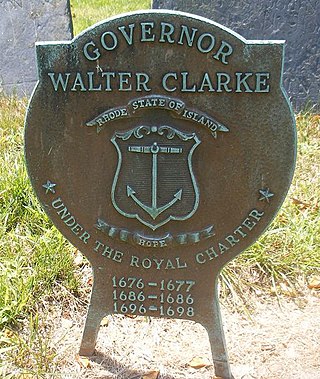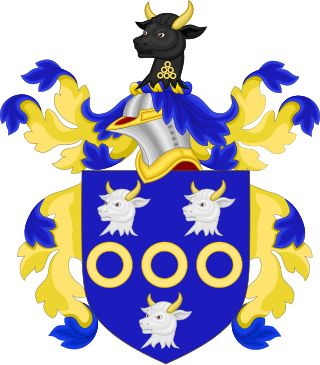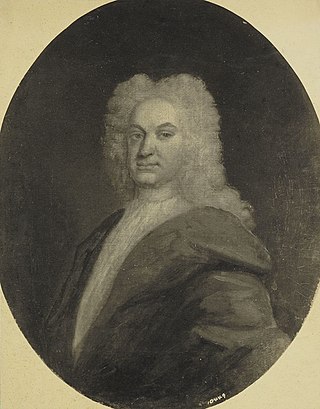Related Research Articles
Nicholas Easton (c.1593–1675) was an early colonial President and Governor of Rhode Island. Born in Hampshire,England,he lived in the towns of Lymington and Romsey before immigrating to New England with his two sons in 1634. Once in the New World,he lived in the Massachusetts Bay Colony towns of Ipswich,Newbury,and Hampton. Easton supported the dissident ministers John Wheelwright and Anne Hutchinson during the Antinomian Controversy,and was disarmed in 1637,and then banished from the Massachusetts colony the following year. Along with many other Hutchinson supporters,he settled in Portsmouth on Aquidneck Island,later a part of the Colony of Rhode Island and Providence Plantations. He was in Portsmouth for about a year when he and eight others signed an agreement to create a plantation elsewhere on the island,establishing the town of Newport.
John Cranston (1625–1680) was a colonial physician,military leader,legislator,deputy governor and governor of the Colony of Rhode Island and Providence Plantations during the 17th century.

William Brenton was a colonial President,Deputy Governor,and Governor of the Colony of Rhode Island and Providence Plantations,and an early settler of Portsmouth and Newport in the Rhode Island colony. Austin and other historians give his place of origin as Hammersmith in Middlesex,England,but in reviewing the evidence,Anderson concludes that his place of origin is unknown. Brenton named one of his Newport properties "Hammersmith," and this has led some writers to assume that the like-named town in London was his place of origin.

Jeremy Clarke (1605–1652) was an early colonial settler and President of the Colony of Rhode Island and Providence Plantations. Born into a prominent family in England,he was a merchant who came to New England with his wife,Frances Latham,and four stepchildren,settling first at Portsmouth in 1638,but the following year joining William Coddington and others in establishing the town of Newport. Here he held a variety of civic positions until 1648 when Coddington's election as President of the colony was disputed,and Clarke was chosen to serve in that office instead. He was the father of Walter Clarke,another colonial governor of Rhode Island,and also had family connections with several other future governors of the colony.

Walter Clarke (1640–1714) was an early governor of the Colony of Rhode Island and Providence Plantations and the first native-born governor of the colony. The son of colonial President Jeremy Clarke,he was a Quaker like his father. His mother was Frances (Latham) Clarke,who is often called "the Mother of Governors." While in his late 20s,he was elected as a deputy from Newport,and in 1673 was elected to his first of three consecutive terms as assistant. During King Philip's War,he was elected to his first term as governor of the colony. He served for one year in this role,dealing with the devastation of the war,and with the predatory demands of neighboring colonies on Rhode Island territory during the aftermath of the war.

Henry Bull (1610–1694) was an early colonial Governor of Rhode Island,serving for two separate terms,one before and one after the tenure of Edmund Andros under the Dominion of New England. Sailing from England as a young man,Bull first settled in Roxbury in the Massachusetts Bay Colony,but soon became a follower of the dissident ministers John Wheelwright and Anne Hutchinson,and was excommunicated from the Roxbury church. With many other followers of Hutchinson,he signed the Portsmouth Compact,and settled on Aquidneck Island in the Narragansett Bay. Within a year of arriving there,he and others followed William Coddington to the south end of the island where they established the town of Newport.
Col. Joseph Whipple Sr. was a wealthy merchant in the Colony of Rhode Island and Providence Plantations,and active in the civil affairs of the colony during the first half of the 18th century. The son of John Whipple and Sarah Whipple,who were early settlers of Dorchester in the Massachusetts Bay Colony and later of Providence,Whipple was born in Providence,the 10th of 11 children. He began his public service to the colony in 1698,selected as a Deputy from Providence,and served in that capacity for a majority of the years until 1728. He also served on the Providence Town Council for 15 years between 1703 and 1729,and was an Assistant in 1714. From 1719 to 1720 he was Colonel of the regiment of militia for the mainland. In 1696 he and others were granted a lot on which to build a schoolhouse,and in 1710 he was licensed to keep a public house,paying 20 shillings for the privilege. Whipple died in 1746,leaving a sizable estate to his children and grandchildren. He was buried in the North Burial Ground in Providence.

Caleb Carr was a governor of the Colony of Rhode Island and Providence Plantations,serving a very short term prior to his death. In 1635,at the age of 19,he sailed from England on the ship Elizabeth and Ann with his older brother Robert. Carr's name appears on a list of Newport freemen in 1655,and he began serving in a civil capacity the year prior when he became a commissioner. He served in this capacity for a total of six years between 1654 and 1662,and then served as deputy for 12 years from 1664 to 1690. During the years when he wasn't serving as deputy,he was an assistant,serving in this role for a total of ten years. From 1677 to 1678 he was the justice of the General Quarter Session and Inferior Court of Common Pleas.

Richard Ward was a governor of the Colony of Rhode Island and Providence Plantations,serving for one complete term from 1741 to 1742.

William Greene Sr. was a governor of the Colony of Rhode Island and Providence Plantations. He was a clerk of the county court in Providence,deputy from Warwick,speaker of the Rhode Island Assembly,and then deputy governor from 1740 to 1743. He became governor for the first time in 1743 and served four separate terms for a total of 11 years,and died while in office during his final term.

John Coggeshall Jr. was a deputy governor of the Colony of Rhode Island and Providence Plantations.

Joseph Jenckes was a deputy governor and governor of the Colony of Rhode Island and Providence Plantations.

Capt. Jonathan Nichols Sr. was a deputy governor of the Colony of Rhode Island and Providence Plantations. He was the son of Thomas and Hannah Nichols of Newport. Nichols became a freeman of Newport in 1707,then served many years as either Deputy or Assistant from 1713 to 1727. In 1718 he was called Captain,and in 1721 he was appointed to a committee to rebuild or repair Fort Ann on Goat Island. In May 1727 Nichols was selected as the Deputy Governor of the Rhode Island colony,but he died in office less than three months later in August,and Thomas Frye completed his term.
Thomas Fry was a deputy governor of the Colony of Rhode Island and Providence Plantations. The son of Thomas and Mary Fry of Newport and East Greenwich in the Rhode Island colony,he was a glazier by trade. He became a freeman of East Greenwich in 1690,aged about 24,and began a long career of civil service in 1696 when he became a deputy,serving in that role during most years over a period of three and a half decades. From 1698 to 1704 he was Justice of the Peace,he later served as Clerk of the Assembly for several years,and he was Speaker of the House of Deputies for ten years between 1713 and 1730. In 1707 he was appointed one of the commissioners to settle with Massachusetts the northern boundary of Rhode Island,and two years later he was appointed to a committee to run lines between the two colonies. In 1715,he and Andrew Harris were appointed by the Assembly to transcribe and to prepare for the press all the laws of the colony,and in 1719 he was allowed ten pounds for his efforts to get the laws printed.

Daniel Abbott was a deputy governor of the Colony of Rhode Island and Providence Plantations.
George Hazard was a deputy governor of the Colony of Rhode Island and Providence Plantations.

Joseph Whipple Jr. was a wealthy merchant in the Colony of Rhode Island and Providence Plantations,and a Deputy Governor of the colony.
Robert Hazard was a deputy governor of the Colony of Rhode Island and Providence Plantations.
John Gardner served for more than eight years as the deputy governor of the Colony of Rhode Island and Providence Plantations,and was also a Chief Justice of the colony's Superior Court.
Jonathan Nichols Jr. was a deputy governor of the Colony of Rhode Island and Providence Plantations. He was the son of former Deputy Governor Jonathan Nichols Sr. and Elizabeth Lawton. Nichols became Deputy Governor in November 1753 when his predecessor,Joseph Whipple III,resigned amid the collapse of his personal fortune,and Nichols completed his term. In 1755 Nichols was again selected as Deputy Governor,completing his first one-year term,then dying during his second year in office.
References
- 1 2 3 4 5 6 7 Austin 1887, p. 394.
- ↑ Austin 1887, pp. 395–7.